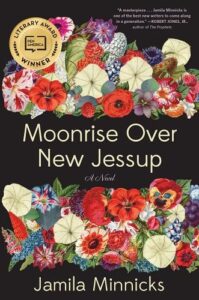
Writing Fiction Is a Way to Ensure My Ancestors’ Stories Are Remembered
Jamila Minnicks on Finding Inspirations in Her Family’s Triumphs—Not Only Their Traumas
“This one again?” Mama protested falsely, as betrayed by the glint in her eye whenever we asked for the Alphonso story. Her pursed lips suggested that it was almost a bother to tell, but after a little prodding, she began to describe the way my grandaddy, Daddy John, would receive one of her beaus coming to call. Not out on the porch, mind you, but inside the house, in the parlor where important guests were received. But sit on that couch, he told them. Her grin took a wickedly northern turn as she described my grandaddy chatting the young man up, asking about his particulars (Yes, that’s nice), where he intended to take my mama for the evening (Sounds alright), and what time he planned to bring her home (That’s fine).
Then, all of a sudden, Daddy John would rise, walk over, and lean in close. So close that the young man would have to lean away from my grandaddy, who, by then, had begun digging in the couch. From where he would ease a small rifle from the underside of the cushions, and the young man’s eyes would become saucers after having been perched atop a long gun during the entire chat with my grandaddy.
“There it is,” Mama mimicked Daddy John as he “found” his strategically placed, unloaded rifle. “Good thing I found it, too. These things can go off at the damndest times.”
According to my mama, this is how Daddy John greeted all her beaus when they came over. Her cool manner belied the narrative shock of the tale, but she told it for true. And later in life, cousins, aunts, and uncles (mostly) confirmed this, and other accounts about the life my family lived in Demopolis, Alabama.
Though Daddy John and Mama Bea, my grandmama, passed before I was born, they both lived in Mama’s memory and through my family’s stories. Growing up in the Chicago suburbs, Mama taught my siblings and me that Alabama was the place where my great-great granddaddy Preston helped to found our home church; was where my mama vied with the same girl from first through twelfth grade for class valedictorian; was where Daddy John and his brothers all built one another’s “big white houses on the corner” of the blocks where they each lived—by hand.
Demopolis was where Mama Bea taught my mama to sew; where she told my mama to hold her head high, but not to have her “nose in the clouds”; and where she wrapped my mama in the same affirmation-filled hugs every day before she went to school that my mama left us with until she passed. Mama talked about beaus and classmate rivalries and fig trees and great uncles with their Model Ts and shooting a rifle with such precision they nicknamed her Annie Oakley. My family’s roots are deep in Alabama soil, extending well before Emancipation. And our community was one where people shared to the last nickels and dimes.
Alabama raised my mama to be a woman who bought her children every Black book she could find. Every Christmas of my early years, a Black babydoll appeared for my sister and me under the tree—though these were collector’s items, never to be played with. At twelve, when I decided to become an Air Force pilot, my mama took me to meet living Tuskegee Airmen at the Chicago Air and Water Show, and I sat in the red-tailed plane they had on display. When I decided to become a lawyer, she introduced me to the first Black woman to serve on the Seventh Circuit Court of Appeals. My mama taught me to become the woman I am today, and she was raised in Demopolis, Alabama.
While trauma is imprinted on Black DNA as intuition, and certainly informs our steps as we navigate this world, what harms us remains with us but does not define us. Our family was certainly not immune to the realities of anti-Black racism in Alabama or anywhere else. But my family’s stories were more complete and nuanced than any singular Black history narrative. Degradation is not the entirety of our tales.
While trauma is imprinted on Black DNA as intuition, and certainly informs our steps as we navigate this world, what harms us remains with us but does not define us.
Which is one of the many reasons I write fiction—as catharsis for the trauma imprinted on my DNA, yes, but also, because of the immense responsibility, and honor, to ensure that my ancestors’ stories are documented and remembered.
Since I cannot tell every tale, I hope my work inspires readers to memorialize their own family lore, and to become more curious about the many facets of Black history. Because, as Chinua Achebe relays the West African proverb: “Until the lion has its own historians, the tale of the hunt will always glorify the hunter.” I come from people rich in heritage and culture and laughter and love. And resilience.
In the summer of 2020, my goal was to write a short story about a Black family debating the merits of Brown v. Board of Education around a holiday table. But less than ten minutes into writing, it was Alice who captured my imagination. I envisioned her sliding food on the table with a grin on her face so familiar to the women in my family—the slight curve of her lips, and the sparkle in her eye that said she knew her mind on the matter, and that everyone else knew it too, so no need to jump into that mess.
This woman with her own opinions and motivations and magic and voice was keeping her mind behind that Alabama smile like so many who came before us. That smile assured me that Alice’s life was a whole story that deserved to be remembered and celebrated. And as I dove deeper into New Jessup, my family’s comprehensive telling of our history encouraged me to interview, comb through archives, explore texts, and just allow the Alabama soil to reveal Alice to me.
It is through her lens that we see New Jessup in its fuller context—its triumphs and struggles outside the traditional narratives of oppression and degradation. Moonrise Over New Jessup is the story of how Alice found her way, made her home, made mistakes. And thrived. And just like my mama, Alice demands that I tell it all for true.
________________________________

Moonrise Over New Jessup by Jamila Minnicks is available now via Algonquin.
Jamila Minnicks
Jamila Minnicks is the author of Moonrise Over New Jessup, the 2021 winner of the PEN/Bellwether Prize for Socially Engaged Fiction. Her work is also published in CRAFT Literary Magazine, The Write Launch, and The Silent World in Her Vase. Her piece "Politics of Distraction" was nominated for a Pushcart Prize. She is a graduate of the University of Michigan, the Howard University School of Law, and Georgetown University. She lives in Washington, DC.



















